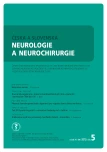-
Medical journals
- Career
Gitelman’s Syndrome Associated with Tetany – a Case Report
Authors: Z. Doležel 1; H. Ošlejšková 2; J. Papež 1; P. Hanáková 2
Authors‘ workplace: LF MU a FN Brno Pediatrická klinika 1; LF MU a FN Brno Klinika dětské neurologie 2
Published in: Cesk Slov Neurol N 2013; 76/109(5): 634-636
Category: Case Report
Overview
Tetany is a condition of increased neuromuscular excitability with variable clinical manifestations. Tetany is the most frequently associated with hypocalcaemia. Tetany is less frequently associated with Gitelman’s syndrome. It is a salt-losing renal tubulopathy that is characterized by hypokalaemia, hypomagnesaemia, metabolic alkalosis, hypocalciuria and hyperreninemic-hyperaldosteronism. This case study describes a 16-year-old girl with two undiagnosed episodes of normocalcaemic tetany. Following the third manifestation of tetany, a large battery of laboratory tests was performed and, based on these data, clinical diagnosis of Gitelman’s syndrome was made. Diagnosis of Gitelman’s syndrome was confirmed by gene-sequencing analysis.
Key words:
hypokalaemia – hypomagnesaemia – tetany – Gitelman’s syndrome
The authors declare they have no potential conflicts of interest concerning drugs, products, or services used in the study.
The Editorial Board declares that the manuscript met the ICMJE “uniform requirements” for biomedical papers.
Sources
1. Vargas ‑ Poussou R, Dahan K, Venisse A, Riviera ‑ Munoz E, Debaix H, Grisart B et al. Spectrum of mutations in Gitelman syndrome. J Am Soc Nephrol 2011; 22(4): 693 – 703.
2. Ueda K, Makita N, Kawarazaki H, Fujiwara T, Unuma S, Monkawa T et al. A novel compound heterozygous mutation of Gitelman’s syndrome in Japan, as diagnosed by an extraordinary response of the fractional excretion rate of chloride in the trichlormethiazide loading test. Intern Med 2012; 51(12): 1549 – 1553.
3. Skalova S, Neuman D, Lnenicka P, Stekrova J. Gitelman syndrome as a cause of psychomotor retardation in a toddler. Arab J Nephrol Transplant 2013; 6(1): 37 – 39.
4. Raza F, Sultan M, Qamar K, Jawad A, Jawa A. Gitelman syndrome manifesting in early childhood and leading to delayed puberty: a case report. J Med Case rep 2012; 6(1): 331.
5. Tammaro F, Bettinelli A, Cattarelli D, Cavazza A, Colombo C, Syrén ML et al. Early appearance of hypokalemia in Gitelman syndrome. Pediatr Nephrol 2010; 25(10): 2179 – 2182.
6. Fremont OT, Chan JC. Understanding Bartter syndrome and Gitelman syndrome. World J Pediatr 2012; 8(1): 25 – 30.
7. Cortesi C, Lava SA, Bettinelli A, Tammaro F, Giannini O, Caiata ‑ Zufferey M et al. Cardiac arrhythmias and rhabdomyolysis in Bartter ‑ Gitelman patients. Pediatr Nephrol 2010; 25(10): 2005 – 2008.
8. Rim PC, Keith MP. Chondrocalcinosis and hypomagnesemia in a 26‑year ‑ old woman. J Clin Rheumatol 2011; 17(6): 334 – 335.
9. Slovacek L. Gitelman’s syndrome: A hereditary disorder characterized by hypokalemia and hypomagnesaemia. Eur J Gen Med 2009; 6(2): 127 – 130.
10. Rušavý Z, Hudec A, Karbanová J, Korečko V, Janů R,Kališ V. Gitelman syndrome in pregnancy – a severe hypokalemia with favorable perinatal prognosis. Ceska Gynekol 2012; 77(5): 421 – 423.
Labels
Paediatric neurology Neurosurgery Neurology
Article was published inCzech and Slovak Neurology and Neurosurgery

2013 Issue 5-
All articles in this issue
- Wilson Disease
- Novel Anticoagulants in Prevention of Cardioembolic Stroke in Patiens with Non-Valvular Atrial Fibrillation
- Canabis in the Development and Homeostasis of the Nerve System
- Homocysteine and Multiple Sclerosis
- Quantification of Impairment in Patients with Lumbar Spinal Stenosis
- Glioblastoma Multiforme – a Review of Pathogenesis, Biomarkers and Therapeutic Perspectives
- Current Possibilities of the Use of Magnetic Resonance in the Diagnosis of Normal Pressure Hydrocephalus
- Neurological Complications of Dengue – a Potential Threat for Central Europe
- Accuracy of Pharmacogenetic Algorithms in Predicting Warfarin Daily Dose
- Inter-rater Variability in Assessing Hippocampal Atrophy Using Scheltens Scales
- Comparison of Peri‑ operative Radiation Exposure during an Open and Miniinvasive Transpendicular Fixation of Thoracic and Lumbar Spine
- The 3F Test Dysarthric Profile – Normative Speach Values in Czech
- Surgical Treatment of Supinator Canal Syndrome
- A Strategy for Diagnosis, Therapy and Follow-up of Patiens with CNS Haemangioblastoma from the Perspective of a Neurosurgeon
- Syncope, Blindness and Deafness in Breast Cancer – a Case Report
- Gitelman’s Syndrome Associated with Tetany – a Case Report
- Consumption of Cannabis as a Risk Factor for Ischemic Stroke – a Case Report
- Tumefactive Variant of Multiple Sclerosis – Two Case Reports
- Co-occurrence of the Gene ZNF9 Mutations (Myotonic Dystrophy Type 2) and Gene CLCN1 (Myotonia Congenita) in One Family – a Case Report
- Czech and Slovak Neurology and Neurosurgery
- Journal archive
- Current issue
- Online only
- About the journal
Most read in this issue- Wilson Disease
- Glioblastoma Multiforme – a Review of Pathogenesis, Biomarkers and Therapeutic Perspectives
- Tumefactive Variant of Multiple Sclerosis – Two Case Reports
- The 3F Test Dysarthric Profile – Normative Speach Values in Czech
Login#ADS_BOTTOM_SCRIPTS#Forgotten passwordEnter the email address that you registered with. We will send you instructions on how to set a new password.
- Career

